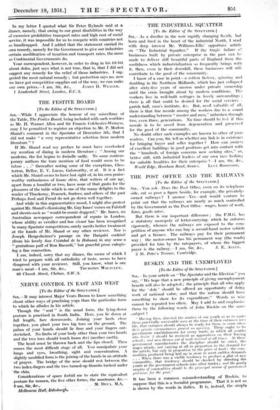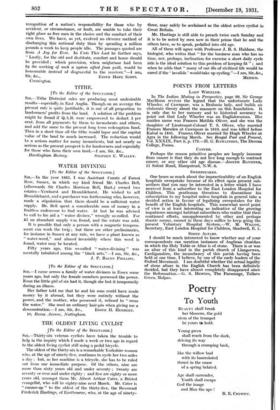RUSKIN AND THE UNEMPLOYED
[To the Editor of the SPECTATOR.] SIR,—In your article on "The Spectator and the Election" you say, We hope that a new principle of giving unemployment benefit will also be adopted ; the principle that all who 'apply for the ' dole ' should be offered an opportunity of doing work of national value, and that the nation should have something to show for its expenditure." Words so wise cannot be repeated too often. May I add to and emphasize them by the following words of John Ruskin on the same .subject? .•
"Having then, directed the studies of our youth so as to make them practically serviceable men at the time of their entrance into life, that entrance should always be ready for them in COFCS where their private circumstances present no opening. Thew ought to be goVernment establishments for every trade, in which all youths who desire it should be received as apprentices on their leaving school ; and men thrown out of work received at all times. At these government manufactories the discipline should be strict, tho wages steady, not varying at all in proportion to the demand for the article, but only in proportion to the price of food : the com- modities produced being laid up in store to meet sudden demands . . . When there was a visible tendency to produce a glut of any commodity, that tendency should be checked by directing the youth at the government schools into other trades ; and the yearly surplus of commodities should be the principal means of government provision for the poor."
It has been a common misunderstanding of Ruskin, to suppose that this is a Socialist programme. That it is not so is shown by the words in italics. It is, instead, the simple recognition of a nation's responsibility for those who by accident, or circumstance, or fault, are unable to take their right place as free men in the choice and the conduct of their own lives. We have, as yet, evolved no cleverer method of discharging this national duty than by spending a million_ pounds a week to keep people idle. The passages quoted are from A Joy for Ever. In Unto This Last he further says, "Lastly, for the old and destitute, comfort and home should be provided ; which provision, when misfortune had been by the working of such a system sifted from guilt, would be honourable instead of disgraceful to the receiver."—! am.



































 Previous page
Previous page